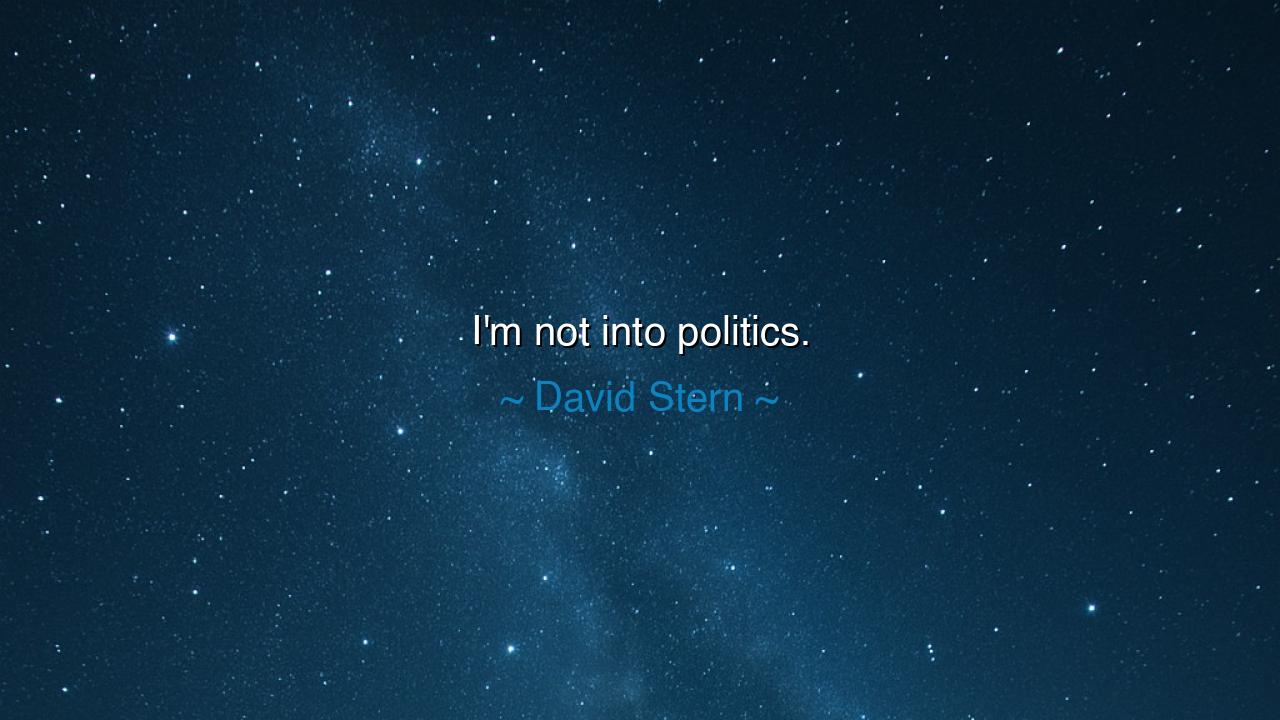
I'm not into politics.






Politics is the ever-shifting tide of power, ambition, and persuasion, a realm that entangles many and shapes the destiny of nations. When David Stern, the legendary NBA commissioner, declared, “I'm not into politics,” his words carried a profound simplicity. They reflect a desire to focus on craft and purpose, to stand apart from the intrigues and divisions that so often cloud human endeavor. In a world where political battles can consume energy and distort intentions, Stern’s statement is not merely about disinterest—it is about clarity of mission and the wisdom of knowing one’s true role.
At the heart of this saying lies the recognition that politics is universal, whether one chooses to engage or not. Even when a person declares they are “not into politics,” politics continues to shape the world around them, silently influencing opportunities, structures, and relationships. Stern’s words, however, reflect a choice to rise above the noise, to focus on the unifying power of sports rather than the divisive currents of partisan struggles. It is a statement of discipline: to build rather than to fight, to lead through action rather than rhetoric.
History offers many examples of individuals who stood at the edge of politics, striving to remain pure in their mission. Consider George Washington, who, after leading a revolution, rejected the idea of becoming king or dictator. Though surrounded by politics, he focused on the principles of governance rather than personal power, warning in his farewell address of the dangers of factions and partisanship. Like Stern, he understood that while politics is unavoidable, one must be careful not to be consumed by it.
Yet there is also a paradox in Stern’s words. Though he may not have sought politics, his leadership of the NBA inevitably intersected with social and political issues. The global expansion of basketball brought him into contact with matters of race, culture, and international diplomacy. This mirrors a truth seen throughout history: even those who declare, “I am not into politics,” often find themselves drawn into its orbit when their actions influence the wider world. Neutrality, too, can be a form of quiet power.
On a personal level, this quote speaks to the challenge of focus in a distracted age. Many are tempted to be swept away by arguments, rivalries, and ideologies, losing sight of their own goals. Stern’s words are a reminder to stay rooted in purpose, to tend the garden of one’s calling rather than be lost in battles that do not serve the higher mission. It is an act of strength to say, “This is not my arena,” and to remain steadfast in one’s chosen path.
Let this teaching be passed down through the generations: while politics is the storm that forever rages, not all must become its sailors. As David Stern’s words reveal, there is honor in choosing to build bridges through service and creation, rather than wielding power through division. Yet even in this choice, one must remain watchful, for politics touches all things, and the wise leader must know when to step aside and when to stand firm for the greater good.






MTNguyen Minh Tam
David Stern saying he’s not into politics makes me think—can we really afford to disengage from something so impactful? Politics shapes so much of our world, and avoiding it might mean missing out on opportunities to influence change. On the other hand, does constantly engaging in politics risk burning out? Is there a healthy middle ground where you’re informed but not overwhelmed?
KKhanh
It’s surprising to hear someone like David Stern say he’s not into politics. With all the debates about sports and politics these days, it seems like it’s impossible to stay completely out of it. But I respect the idea of not forcing political views onto others. Does his statement reflect a deeper frustration with how politics is often handled, or is it more about maintaining a sense of personal peace?
NMNguyen Thi Ngoc Mai
I think David Stern’s comment is something a lot of people can relate to—politics is often frustrating, and it’s easy to feel like it doesn’t impact you directly. But I’m curious: Is there a way to engage in politics in a more meaningful, less stressful way? Can we get involved without feeling like we’re just constantly caught up in negativity and division?
:TNhan :D Thanh
David Stern’s statement resonates with me in a way, as I sometimes feel disillusioned with the political landscape. But on the other hand, I wonder if it’s possible to really stay completely out of politics, especially when so many issues—like healthcare, education, and even sports regulations—are intertwined with political decisions. Does choosing not to be involved mean you're giving up on trying to improve things for everyone?
TLTrinh Lyusagi
I get where David Stern is coming from—politics can feel overwhelming and divisive. But, isn't there a risk that disengaging from it can lead to a lack of awareness about what’s happening in the world? What if avoiding politics ends up making you more vulnerable to decisions being made for you by others? Does it ever feel like staying uninvolved might actually be more harmful than beneficial in the long run?